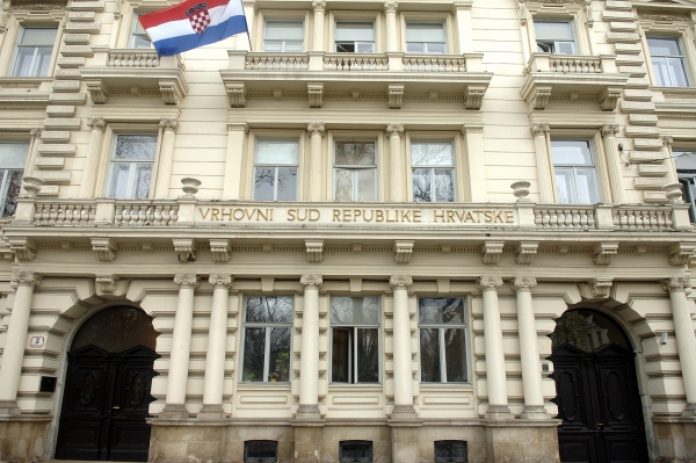
SUCI HRVATSKOG PRAVOSUĐA I DRŽAVNI ODVJETNICI REPUBLIKE HRVATSKE
SKINUTI SU SA TRONA NEDODIRLJIVIH
PO PRESUDI
EUROPEAN COURT OF HUMAN RIGHTS COUR EUROPÉENNE DES DROITS DR L’HOMME
ECHR 378 (2018) 08.11.2018
CASE OF NARODNI LIST D.D. v. CROATIA
(Application no. 2782/12)
JUDGMENT
STRASBOURG
Dostupnost informacije bez obzira odakle je izvor današnje doba omogućava građanima REPUBLIKE HRVATSKE da budu informirani bez obzira da li to odgovara „političkoj eliti“ ili „pravosudnoj eliti“ koja je sebe zaštitila ZAKONOM O SUDOVIMA (NN 28/13 ; 33/15 ; 82/15 ; 82/16 ; 67/18), ZAKONOM O DRŽAVNOM SUDBENOM VIJEĆU (NN 116/10 ; 57/11 ; 130/11; 13/13 ; 28/13 ; 82/15 ; 67/18) , ZAKON O DRŽAVNOM ODVJETNIŠTVU (NN 67/18) i USTAV REPUBLIKE HRVATSKE (NN 56/90 ; 135/97 ; 08/98 ; 113/00 ; 124/00 ; 28/01 ; 41/01 ; 55/01 ; 76/10 ; 85/10 ; 05/14).
U navedenim zakonskim aktima sudci i državni odvjetnici su zaštićeni zakonom imaju zakonski imunitet da ne mogu kazneno i materijalno odgovarati za svoje mišljenje (doneseno rješenje/presudu) bez obzira da li je ono doneseno u skladu sa zakonom ili u suprotnosti sa zakonom.
Presuda iz STRASBOURGA ECHR 378 (2018) 08.11.2018. definira da sudac s obzirom da je to „javna služba“, javna djelatnost . može i smije biti podložna kritici . Sudac , državni odvjetnik može biti prozvan u elektronskim medijima , tiskovinama : dnevnim ili tjednim a da ne budu sankcionirani .
OPĆINSKI sud u Splitu je prethodno presudio, a Županijski sud u Zagrebu ovih dana potvrdio kako Jutarnji list mora isplatiti odštetu članu Državnog sudbenog vijeća (DSV) i sucu splitskog Županijskog suda Nevenu Cambiju od 50 tisuća eura za duševnu bol.
Presuda iz STRASBOURGA ECHR 378 (2018) 08.11.2018. definira da HRVATSKO PRAVOSUĐE nije smijalo kazniti dnevni tisak „JUTARNJI LIST“ zbog prozivke i objava navedenog sudca .
Presuda iz STRASBOURGA ECHR 378 (2018) 08.11.2018. je obvezujuća za REPUBLIKU HRVATSKU što eksplicitno sve sudce REPUBLIKE HRVATSKE i državne odvjetnike REPUBLIKE HRVATSKE „skida“ sa „TRONA – NEDODIRLJIVIH“.
Javnost , građani REPUBLIKE HRVATSKE su kontrolor rada HRVATSKOG PRAVOSUĐA i DRŽAVNOG ODVJETNIŠTVA REPUBLIKE HRVATSKE .
U smislu provedbe kontrole i nadzora nad radom HRVATSKOG PRAVOSUĐA i DRŽAVNOG ODVJETNIŠTVA REPUBLIKE HRVATSKE građani REPUBLIKE HRVATSKE mogu , smiju i moraju prozivati i ukazivati na nepravilnosti rada i ukazivati na rad suprotnom zakonu od strane državnih tijela sa prenesenim ovlastima HRVATSKOG PRAVOSUĐA i DRŽAVNOG ODVJETNIŠTVA REPUBLIKE HRVATSKE pri donošenju rješenja i presuda u njihovoj ingerenciji.
Presuda iz STRASBOURGA ECHR 378 (2018) 08.11.2018. definira da tisak dnevni ili tjedni kao i elektronski mediji koji ažuran po zaprimanju bilo kakve elektronske informacije o postupanju suprotno zakonu može , a i obavezan je objaviti takav tekst bez mogućnosti da bude zakonski sankcioniran , bez obzira kaznenu ili materijalnu odredbu.
Presuda iz STRASBOURGA ECHR 378 (2018) 08.11.2018. odluke , zaključci , rješenja ili presude HRVATSKOG PRAVOSUĐA i DRŽAVNOG ODVJETNIŠTVA REPUBLIKE HRVATSKE su podložne kritici i ukazivanju na odlučivanje suprotno zakonu.
Tekst koji je javno objavljen u javnom elektronskom mediju , tiskovini (tjednoj ili dnevnoj) uredno potpisanoj od autora teksta ne smije biti sankcioniran , a pogotovo HRVATSKOG PRAVOSUĐA ne smije donositi odluke , rješenja ili presude u kontekstu „isplate za nanesenu duševnu bol“ jer je prozvan sudac ili državni odvjetnik iz razloga što je postupao i donio sudski akt suprotan zakonu.
Postavljaju se slijedeća pitanja :
1.) Zašto na „web“ – stranici Ministarstva pravosuđa REPUBLIKE HRVATSKE nije objavljena presuda iz STRASBOURGA ECHR 378 (2018) 08.11.2018. u originalu (na engleskom jeziku) i u prijevodu (na hrvatskom jeziku)
2.) Zašto Ministar pravosuđa REPUBLIKE HRVATSKE gospodin DRAŽEN BOŠNJAKOVIĆ nije objavio predmetnu presudu i zašto nije sazvao tiskovnu, medijsku konferenciju u kojoj bi obrazložio posljedice na HRVATSKO PRAVOSUĐE objavom presude iz STRASBOURGA ECHR 378 (2018) 08.11.2018.
3.) Zašto na „web“ – stranici VRHOVNOG SUDA REPUBLIKE HRVATSKE nije objavljena presuda iz STRASBOURGA ECHR 378 (2018) 08.11.2018. u originalu (na engleskom jeziku) i u prijevodu (na hrvatskom jeziku)
4.) Zašto PREDSJEDNI VRHOVNOG SUDA REPUBLIKE HRVATSKE gospodin ĐURO SESSA nije objavio predmetnu presudu i zašto nije sazvao tiskovnu, medijsku konferenciju u kojoj bi obrazložio posljedice na HRVATSKO PRAVOSUĐE objavom presude iz STRASBOURGA ECHR 378 (2018) 08.11.2018.
5.) Zašto na „web“ – stranici USTAVNOG SUDA REPUBLIKE HRVATSKE nije objavljena presuda iz STRASBOURGA ECHR 378 (2018) 08.11.2018. u originalu (na engleskom jeziku) i u prijevodu (na hrvatskom jeziku)
6.) Zašto PREDSJEDNI USTAVNOG SUDA REPUBLIKE HRVATSKE gospodin dr. sc. ŠEPAROVIĆ MIROSLAVA nije objavio predmetnu presudu i zašto nije sazvao tiskovnu, medijsku konferenciju u kojoj bi obrazložio posljedice na HRVATSKO PRAVOSUĐE objavom presude iz STRASBOURGA ECHR 378 (2018) 08.11.2018.
Neminovno je da presuda iz STRASBOURGA ECHR 378 (2018) 08.11.2018. na HRVATSKO ZAKONODAVSTVO i da određeni zakoni REPUBLIKE HRVATSKE i USTAV REPUBLIKE HRVATSKE se mora uskladiti sa navedenom presudom.
BOŽIDAR VIDUKA
magistar inženjer geodezije i geoinformatike

U nastavku citira se presuda iz STRASBOURGA ECHR 378 (2018) 08.11.2018.
FIRST SECTION
CASE OF NARODNI LIST D.D. v. CROATIA
(Application no. 2782/12)
JUDGMENT
STRASBOURG
8 November 2018
This judgment will become final in the circumstances set out in Article 44 § 2 of the Convention. It may be subject to editorial revision.
In the case of Narodni List d.d. v. Croatia,
The European Court of Human Rights (First Section), sitting as a Chamber composed of:
Linos-Alexandre Sicilianos, President,
Ksenija Turković,
Aleš Pejchal,
Krzysztof Wojtyczek,
Pauliine Koskelo,
Tim Eicke,
Jovan Ilievski, judges,
and Abel Campos, Section Registrar,
Having deliberated in private on 4 July and 9 October 2018,
Delivers the following judgment, which was adopted on the last mentioned date:
PROCEDURE
1. The case originated in an application (no. 2782/12) against the Republic of Croatia lodged with the Court under Article 34 of the Convention for the Protection of Human Rights and Fundamental Freedoms (“the Convention”) by Narodni List d.d. (“the applicant company”), a company incorporated under Croatian law, on 28 December 2011.
2. The applicant was represented by Ms H. Zudenigo, an advocate practising in Zadar. The Croatian Government (“the Government”) were represented by their Agent, Ms Š. Stažnik.
3. The applicant company alleged that by ordering it to pay damages for defaming a judge in its weekly magazine, the domestic courts had violated its freedom of expression.
4. On 30 June 2015 the complaint concerning freedom of expression was communicated to the Government and the remainder of the application was declared inadmissible, pursuant to Rule 54 § 3 of the Rules of Court.
THE FACTS
I. THE CIRCUMSTANCES OF THE CASE
5. The applicant company, Narodni List d.d., is a joint stock company incorporated under Croatian law which has its registered office in Zadar. It was the publisher of a weekly magazine, Narodni List.
A. Background to the case
6. On the morning of 23 November 2006 Ms Z.S.-K., who was at the time a judge of the Zadar Municipal Court, reported to the police Mr A.M., a photojournalist at Narodni List, claiming that on that same morning he had secretly been taking photos of her in front of the Municipal Court building. He was immediately brought in for questioning by the police, after which he was released. He defended himself by saying that he had been photographing the court building and the court employees under the instructions of his editor-in-chief. On the same day Ms Z.S.-K. lodged a criminal complaint against the journalist in question, stating that he had committed the criminal offence of making an unauthorised recording, as defined in Article 131 of the Criminal Code.
7. The day after, on 24 November 2006, the police again questioned A.M., after which they lodged a criminal complaint against him with the Zadar Municipal State Attorney’s Office (Općinsko državno odvjetništvo u Zadru). On the same day, at the request of the police, the investigating judge of the Zadar County Court (Županijski sud u Zadru), Mr B.B., issued a warrant for police to search through the camera used by A.M. and through Narodni List’s computers with a view to finding photographs of Ms Z.S.-K. During the search, which was carried out on the same day between 2.45 p.m. and 4.05 p.m. on the applicant company’s premises, seven police officers in the presence of two witnesses inspected the camera in question and seven computers belonging to the company. They found no photos of Ms Z.S.-K.
8. On the same day, 24 November 2006, a web portal, Index, reported on the search of Narodni List’s premises. The short article implicitly criticised the search by noting that Judge Z.S.-K. had lodged a criminal complaint against the photojournalist, A.M., for the “alleged” unauthorised recording, and ironically referring to that journalist as a “dangerous suspect”. On the same day that web portal also published a statement by the chairman of the Croatian Helsinki Committee, Ž.P., who expressed his organisation’s support forNarodni List and stated that the photojournalist had been taking photographs in a public place, which was not against the law. He added that what was going on was “totally crazy”, that whoever went along with the criminal complaint against A.M. was “not in his right mind” (nije pri sebi), and that the entire topic was “too stupid” to warrant any discussion. The next day Index published a commentary defending freedom of the press and criticising the conduct of the police and judicial authorities in the matter. The article was accompanied by two photographs of the building in which another municipal and county court were located. By publishing those photographs the portal satirically expressed its support for A.M. by joining him, as ironically stated in the article, in his seditious and “subversive actions” of photographing court buildings.
9. In the absence of incriminating evidence, on 12 December 2006 the Zadar Municipal State Attorney’s Office dismissed the criminal complaint against A.M.
B. Impugned article and subsequent civil proceedings
10. Almost two years later, Judge B.B., who had issued the warrant to search the applicant company’s premises, attended the opening of another newspaper in Zadar started by Mr S., a controversial local entrepreneur. The judge thereby again caught the attention of the journalists of Narodni List.
11. On 31 October 2008 Narodni List published a small article on page three entitled “Judge B. should be put in the pillory” (Suca B. treba prikovati na stup sramote)”[1]. The article, featuring a photo of Judge B., read as follows:
“Judge of the Zadar County Court B.B. came to congratulate S. on starting a daily newspaper. Even though that is not allowed under […] the Code of Judicial Ethics because of the potential conflict of interest, B. nevertheless stopped by for a drink with his acquaintance from old times.
B.’s arrival would have gone unnoticed had this judge not become ‘famous’ [even] outside Croatia’s borders by illegally signing a warrant to search [the premises of] Narodni List. On the basis of that authorisation a herd of policemen raided [the premises of] Narodni List looking for photos of his colleague, Judge S.-K. That [set] a precedent unknown in western democracies.
What B. is doing in journalistic circles is known only to the crew around S. In the western world journalists put such judges in the pillory.”
12. Judge B.B. asked the newspaper to publish an apology but it refused to do so.
13. On 26 November 2008 the judge brought a civil action for defamation against the applicant company before the Benkovac Municipal Court (Općinski sud u Benkovcu), seeking 50,000 Croatian kunas (HRK) in compensation for non-pecuniary damage. He argued that the article constituted an open invitation to lynch him and that it had harmed his reputation in that it called into question his moral and professional integrity by insinuating that he had broken the law while exercising his duties as a judge. Throughout the proceedings the applicant company was represented by Mr V.Š. (see paragraphs 25, 28-29 below).
14. By a judgment of 10 March 2010 the Municipal Court ruled for the plaintiff and ordered the applicant company to pay him HRK 50,000[2] in compensation for non-pecuniary damage in the form of his tarnished reputation, as well as HRK 6,005[3] with respect to costs of proceedings. The relevant part of that judgment reads as follows:
“It is undisputed between the parties that the impugned text constitutes a value judgment …
…
Section 21(1) of the Media Act prescribes that a publisher who causes damage to another person by [publishing] information in the media is obliged to compensate [that person], except in cases prescribed by the same Act (section 21(4)).
…
… this court finds that the defendant [company], as the publisher, … by publishing the impugned text entitled ‘Judge B. should be put in the pillory’ and the [accompanying] photo of the plaintiff, exceeded the bounds of the freedom to publish information, to the prejudice of the plaintiff. [By publishing that information the defendant company], without [presenting] valid arguments, and contrary to journalistic ethics, harmed the plaintiff’s reputation, honour and dignity as an individual and as a judge of the Zadar County Court. [This court also finds] that the impugned damaging information does not constitute any [of the types of] information listed in section 21(4) of the Media Act. For these reasons the plaintiff is entitled to compensation for non-pecuniary damage sustained by the breach of his rights of personality [prava osobnosti] within the meaning of section 22(1) of the Media Act and section 1100(1) and (2) of the Obligations Act – that is to say to just financial compensation in the amount claimed by the action. When determining the level of just financial compensation the court, guided by the principle of proportionality, took into account the consequences of the defendant [company]’s statements, which exceeded the bounds of acceptable criticism …”
15. By a judgment of 3 December 2010 the Split County Court (Županijski sud u Splitu) dismissed an appeal by the applicant company and upheld the first-instance judgment, which thereby became final. The relevant part of the second-instance judgment reads as follows:
“… in its appellate arguments the defendant [company] actually states the reasons whereby it justifies the publication of the impugned article.
However, there is no justification for it. Beginning with its headline (‘Judge B. should be put in the pillory’) the impugned article does not use acceptable and normal ways of expression. In that sense the following statements are worth noting: ‘B’s arrival would have gone unnoticed had this judge not become ‘famous’ [even] outside Croatia’s borders by illegally signing the warrant to search [the premises of]Narodni List’ and ‘What B. is doing in journalistic circles is known only to the crew around S. In the western world journalists put such judges in the pillory’. [Those statements] represent a grave personal media attack on the plaintiff [aimed at] settling scores with [him] in a very rude way, because of [the defendant company’s] dissatisfaction with a decision that the plaintiff adopted in the exercise of his duty as a judge. The article depicts the plaintiff as a person unworthy of judicial office and calls into question his professional competence … The plaintiff’s honour, reputation and dignity, and also his professional dignity, were thereby violated, which justifies awarding non-pecuniary damages in respect of a breach of his rights of personality.
…
… when publishing information containing value judgments, journalists are obliged to respect the dignity, honour and reputation of the person they write about and to avoid using insulting and demeaning expressions, because the publisher cannot escape liability for damages where … a value judgment is expressed in an insulting manner.”
16. The applicant company then, on 16 February 2011, lodged a constitutional complaint alleging violations of its freedom of expression and its right to fair procedure, both guaranteed by the Constitution. It also relied on Article 10 of the Convention.
17. By a decision of 19 October 2011 the Constitutional Court (Ustavni sud Republike Hrvatske) dismissed the applicant company’s constitutional complaint. It held that freedom of expression was not absolute and could be restricted for the protection of the dignity, reputation and honour of others, which rights were also guaranteed by the Constitution. In particular, the Constitutional Court held that the ordinary courts had correctly applied the relevant substantive law and given sufficient reasons for their judgments.
II. RELEVANT DOMESTIC LAW
A. The Constitution
18. The relevant part of the Constitution of the Republic of Croatia (Ustav Republike Hrvatske, Official Gazette no. 56/90 with subsequent amendments) provides as follows:
Article 16
“(1) Rights and freedoms may be only restricted by law in order to protect the rights and freedoms of others, the legal order, public morals or health.
(2) Every restriction of rights and freedoms should be proportional to the nature of the necessity for the restriction in each individual case. …”
Article 38
“(1) Freedom of thought and expression shall be guaranteed.
(2) Freedom of expression shall include in particular freedom of the press and other media, freedom of speech and [the freedom] to speak publicly, and the free establishment of all media institutions.
(3) Censorship shall be forbidden. Journalists shall have the right to freedom of reporting and access to information.
(4) The right to correction shall be guaranteed to anyone whose rights guaranteed by the Constitution or by statute have been breached by [the publication of] information in the public domain.”
B. Media Act
19. The relevant provisions of the Media Act (Zakon o medijima, Official Gazette, no. 59/04 with subsequent amendments), which entered into force on 1 January 2006, read as follows:
Liability for damage
Section 21
“(1) A publisher who causes damage to another person by publishing [certain] information in the media shall be obliged to compensate [that person], except in the cases provided in this Act.
…
(4) The publisher shall not be liable for damages if the damaging information:
…
– concerned value judgments [on the part of] the author, the publication of which was in the public interest, and if that information was given in good faith.”
C. Obligations Act
Relevant provisions
20. The relevant provisions of the Obligations Act (Zakon o obveznim odnosima, Official Gazette, no. 35/05 with subsequent amendments), which entered into force on 1 January 2006, read as follows:
Rights of personality
Section 19(1) and (2)
“(1) Every natural person or legal entity is entitled to the protection of its rights of personality (prava osobnosti) under the conditions provided by law.
(2) Rights of personality within the meaning of this Act are the right to life, physical and mental health, reputation, honour, dignity, [good] name, privacy in respect of personal and family life, liberty, etc.”
Grounds for liability
Section 1045(1)
“Anyone who causes damage to another shall be bound to compensate [that person] unless he or she proves that the damage occurred through no fault of his or her own.”
Damage
Section 1046
“Damage is the diminution of one’s property (actual damage), prevention of its increase (lost profits), or breach of the rights of personality (non-pecuniary damage).”
…
V. REDRESS FOR NON-PECUNIARY DAMAGE
Publication of a judgment or correction
Section 1099
“In the event of a breach of the rights of personality a court may order, at the expense of the tortfeasor, publication of the judgment, or a correction, or order the tortfeasor to retract the statement that caused the breach, or [order] any other form of redress capable of attaining the purpose [otherwise] achieved by an award of damages.”
Non-pecuniary damages
Section 1100(1) and (2)
“(1) A court shall award non-pecuniary damages for a breach of the rights of personality if it finds that the gravity of the breach and the circumstances of the case justify such an award, irrespective of any award of pecuniary damages, and even in the absence of pecuniary damage.
(2) When deciding on the level of non-pecuniary damages, the court shall take into account the intensity and the duration of physical pain, mental anguish and fear caused by the breach, the purpose of those damages, [and the fact] that it should not favour aspirations that are incompatible with their nature and social purpose.”
D. Code of Judicial Ethics and the legislation governing prevention of conflict of interest
21. Code of Judicial Ethics (Kodeks sudačke etike, Official Gazette no. 131/06) contains no rules on prevention of conflict of interest.
22. The applicability of the Act on Prevention of Conflict of Interest in the Exercise of Public Functions of 2003 (Zakon o sprječavanju sukoba interesa u obnašanju javnih dužnosti, Official Gazette no. 163/03 with subsequent amendments), and the Prevention of Conflict of Interest Act of 2011 (Zakon o sprječavanju sukoba interesa, Official Gazette no. 26/11 with subsequent amendments) to members of judiciary has been limited to judges of the Constitutional Court and the president of the Supreme Court.
THE LAW
I. ALLEGED VIOLATION OF ARTICLE 10 OF THE CONVENTION
23. The applicant company complained that the Zadar Municipal Court’s judgment of 10 March 2010 ordering it to pay damages for the injury to Judge B.’s reputation had constituted a violation of its freedom of expression. It relied on Article 10 of the Convention, which reads as follows:
“1. Everyone has the right to freedom of expression. This right shall include freedom to hold opinions and to receive and impart information and ideas without interference by public authority and regardless of frontiers. This Article shall not prevent States from requiring the licensing of broadcasting, television or cinema enterprises.
2. The exercise of these freedoms, since it carries with it duties and responsibilities, may be subject to such formalities, conditions, restrictions or penalties as are prescribed by law and are necessary in a democratic society, in the interests of national security, territorial integrity or public safety, for the prevention of disorder or crime, for the protection of health or morals, for the protection of the reputation or rights of others, for preventing the disclosure of information received in confidence, or for maintaining the authority and impartiality of the judiciary.”
24. The Government contested that argument.
A. Admissibility
1. The submissions of the parties
25. In their observations of 26 October 2015 the Government submitted that the application had been lodged in the name of the applicant company by Mr V.Š., who had never been the company’s director. They furnished an extract from the register of commercial companies proving this. This meant that the applicant company was not and had never been represented before the Court by a person entitled to act under the domestic law on its behalf and in its name.
26. The Government further submitted that the Narodni List weekly was no longer published by the applicant company but by an association, Udruga Narodni List, founded in 2012.
27. For these reasons the Government argued that it would be worth verifying whether the applicant company had any interest in pursuing the proceedings before the Court.
28. The applicant company replied that V.Š. was the “elected” representative of the company, regardless of the information in the register of commercial companies. Besides, he had been recognised by the domestic courts as the applicant company’s representative in the proceedings complained of.
2 The Court’s assessment
29. The Court notes that the extract from the register of commercial companies furnished by the Government indeed suggests that V.Š. has never been the applicant company’s director or a member of the company’s management board. However, according to the same extract he has been a member of the applicant company’s supervisory board and was indeed in each judicial decision delivered in the proceedings complained of referred to as a person entitled to represent the company (see paragraphs 14-15 and 17 above).
30. More importantly, the Court notes that the authority form dated 17 November 2015 authorising the applicant company’s advocate (see paragraph 2 above) to represent the company in the proceedings before the Court was signed by Ms N.Š.-P., who is, according to the information in the register of commercial companies, the applicant company’s director and, as such, the person entitled to represent it under the domestic law.
31. In these circumstances the Court considers that there is no indication that the present application was lodged against the applicant company’s will or that the company has no interest in pursuing the case.
32. Likewise, the Court finds of little relevance the Government’s argument that Narodni List is no longer published by the applicant company. It was the applicant company which – as the publisher of the weekly at the relevant time – suffered prejudice by having to pay damages and costs in the proceedings complained of (see paragraph 14 above).
33. It follows that the Government’s arguments, which amount to objections in respect of a lack of locus standi and a lack of victim status, must be dismissed.
34. The Court further notes that the application is not manifestly ill founded within the meaning of Article 35 § 3 (a) of the Convention. It also notes that it is not inadmissible on any other grounds. It must therefore be declared admissible.
B. Merits
1. The submissions of the parties
(a) The applicant company
35. The applicant company addressed three issues:
– insufficient reasons given by the domestic courts to justify a restriction on the expression of value judgments,
– the allegedly insulting character of the article,
– the disproportionate level of damages that the company had been ordered to pay.
36. The applicant company argued that the domestic courts had not given sufficient reasons for their judgments. In particular, they had failed to define and explain the limits on the freedom of journalists to express value judgments. In this connection the applicant company was particularly critical of the scanty reasoning that the Constitutional Court had given for its decision of 19 October 2011, in which it had effectively confined itself to the statement that the restriction of the applicant company’s freedom of expression had been justified because that freedom was not absolute (see paragraph 17 above).
37. As regards the allegedly insulting character of the impugned article, the applicant company submitted that the article had aimed to suggest, in a metaphorical way, that Judge B.B. should have been ashamed of himself as he had, by indiscriminately issuing a search warrant (see paragraph 7 above), assumed the leading role in the groundless criminal investigation against one of the company’s journalists for taking photos of a public figure in a public space, an act that could not possibly have amounted to a criminal offence. The applicant company further argued that the expressions used in the article had reflected the general atmosphere in society and the judiciary, and had corresponded to the level of public dialogue in Croatia at the relevant time. Furthermore, the supposedly insulting character of the article had matched the level of arbitrariness in decision-making when Judge B.B. had issued a warrant to search the applicant company’s premises in 2006. Finally, the arbitrary character of both the criminal investigation against one of its journalists and of the contested judgments whereby the applicant company had been ordered to pay compensation for tarnishing the reputation of Judge B.B. had instilled fear in the journalists of Narodni List as to how they would continue to make a living and had consequently led to self-censorship.
38. As regards the proportionality of the sanction, the applicant company submitted that at the relevant time, the circulation of Narodni List had been 900 copies per week, with a net income of HRK 3.5 per copy. The applicant company further submitted that it had only ten employees, that it was made financially viable through voluntary contributions, and that the level of the damages it had been ordered to pay could have bankrupted it. Lastly, the applicant company argued that the level of damages had been established arbitrarily, without any relevant reasons being given.
(b) The Government
39. The Government considered it indisputable that the judgment whereby the domestic courts had ordered the applicant company to pay damages to Judge B.B. had constituted an interference with the company’s freedom of expression. However, that interference had been in accordance with Article 10 § 2 of the Convention because it had been lawful, had pursued a legitimate aim and had been necessary in a democratic society.
40. The Government submitted in particular that the interference in question had been lawful because it had been based on section 22(1) of the Media Act (see paragraph 19 above) and section 1100(1) and (2) of the Obligations Act (see paragraph 20 above), and that it had sought to protect the reputation and the rights of others, namely the reputation of Judge B.B.
41. That interference had also been “necessary in a democratic society”, according to the criteria established in the Court’s case-law (the Government cited Haldimann and Others v. Switzerland, no. 21830/09, ECHR 2015) for determining whether the requisite balance was struck between the freedom of expression and the right to respect for private life, specifically:
– contribution to a debate of general interest;
– how well-known the person concerned is and what is the subject of the report;
– the prior conduct of the person concerned;
– the method of obtaining the information and its veracity;
– the content, form and consequences of the publication; and
– the severity of the sanction imposed.
42. As to the first criterion, the Government acknowledged that issues concerning the functioning of the justice system, in particular the way in which search warrants and other warrants were being issued, constituted questions of public interest, debate on which enjoyed the protection of Article 10 of the Convention. However, in their view, the impugned article had not contributed to a debate of general interest in any way. That was because:
– the publication of the impugned article had been motivated by the applicant company’s discontent with Judge B.B.’s decision to issue a warrant for a search of its premises in 2006 (see paragraph 7 above);
– the article in question had been published two years after that search;
– apart from a few articles published on Internet portals immediately after the search (see paragraphs 8 above), it had not triggered a strong public reaction and debate, let alone stirred a wide-ranging public outcry, as suggested in the impugned article;
– the publication of the article had not been preceded by any wider public debate on the legality of work of judges, police searches, or freedom of the press, nor had its publication been triggered by another controversial decision by Judge B.B.; rather, the immediate reason for its publication had been his appearance at a party;
– the article had been terse and had not given factual background information suitable for a debate or advanced any relevant arguments to support the (offensive) allegations contained in it;
– neither the applicant company nor journalist A.M. had formally complained or objected to (the lawfulness of) the search.
For the Government, in view of all these elements, it was difficult to discern how the arrival of Judge B.B. at a party had been related to the allegedly illegal search that he had ordered two years earlier, and how reporting on it had contributed to any public debate on a matter of general interest.
43. As to the second criterion, the Government acknowledged that for the purposes of Article 10 of the Convention a judge could be considered a public figure when exercising his professional duties and that the courts were not immune from criticism and review. However, a clear distinction had to be made between criticism and insult. The Court had held that the judiciary must enjoy public confidence if it was to be successful in carrying out its duties, and that it should be protected from destructive attacks, especially in view of the fact that a duty of discretion precluded judges from replying. In this connection the Government reiterated that the event which had triggered the publication of the impugned article had been the appearance of Judge B.B. at a party, which he had attended in his private capacity. For the journalists of the applicant company that had been sufficient to criticise him for a decision he had made in the exercise of his professional duties.
44. As to the third criterion, the Government claimed that the applicant company had itself stated, in the proceedings before the first-instance court, that its position towards Judge B.B. had been neutral, save for the disputed search.
45. As to the fourth criterion, the Government noted that the domestic courts had established that the article in question contained value judgments rather than facts (see paragraphs 14-15 above). However, the Government argued that those value judgments had not been based on “reliable and precise” information, in accordance with the ethics of journalism. In particular, as noted by the Split County Court in its second-instance judgment of 3 December 2010 (see paragraph 15 above), the applicant company had stated, without any explanation or basis in fact, that Judge B.B. had violated the Code of Judicial Ethics, that he had faced a conflict of interest, and that he had issued the search warrant unlawfully (even though the search’s lawfulness had never been called into question by the applicant company or its employee, journalist A.M.).
46. As to the fifth criterion, the Government submitted that even though the impugned article was rather short, it had been published in a local newspaper that was widely circulated in the area where Judge B.B. lived and worked and where his family lived. Judge B.B. had long experience in the judiciary and was a member of the criminal department of the Zadar County Court, which was relatively small and consisted of only six judges. The attack on him had jeopardised the confidence the local public had had in him and in the entire court. The article, published under a very provocative headline and accompanied by his photograph, had contained insinuations that he had acted in a manner contrary to judicial ethics and had ignored a possible conflict of interest, as well as allegations that he had been doing his job in a manner that had been contrary to the law and democratic principles. However, the article had not offered any factual and contextual background that could have justified such serious accusations being levelled against a person who should have enjoyed public confidence.
47. The Government argued that according to the Court’s case-law (they cited Mladina d.d. Ljubljana v. Slovenia, no. 20981/10, 17 April 2014) offensive language enjoyed the protection of Article 10 of the Convention only if its purpose was stylistic, whereas that protection was excluded if the sole purpose of such language was to insult. Since, in the Government’s view, the impugned article consisted almost exclusively of insults (the headline itself represented an insult) that had no basis in fact (in respect of the allegations concerning the alleged unlawfulness of the search, breach of judicial ethics or conflict of interest) or wider context, they argued that the insults in question had not had any stylistic purpose. The Government thus considered that the article in question had constituted a gratuitous personal attack on Judge B.B., which was not protected under Article 10 of the Convention.
48. As to the sixth criterion, the Government emphasised that Judge B.B. had been ready to accept an apology but that the applicant company had refused to apologise (see paragraph 12 above). They further submitted that the compensation the applicant company had been ordered to pay had been appropriate in the circumstances, given that the company had exceeded the limits of acceptable criticism in that it had published an article injurious to the reputation of the judge in question without valid arguments and contrary to the ethics of journalism. The award corresponded to the amounts that domestic courts were awarding in similar cases and, in the Government’s view, had not had a chilling effect on the applicant company’s freedom of expression. What is more, in several other judgments various domestic courts had awarded even higher amounts in damages after establishing that the applicant company had, contrary to the ethics of journalism, published articles amounting to personal attacks with the sole purpose of insulting a number of other judges and tarnishing their reputation.
49. In the light of the foregoing, the Government concluded that the impugned article had constituted a gratuitous and destructive personal attack on Judge B.B. which did not enjoy protection under Article 10 of the Convention. The domestic courts had thus properly weighed the applicant company’s freedom of expression against the need to protect B.B.’s reputation as a person and a judge, and had awarded him appropriate compensation. The Government therefore invited the Court to find that there had been no violation of Article 10 of the Convention in the present case.
2. The Court’s assessment
(a) Whether there was an interference
50. The Government conceded that the Benkovac Municipal Court’s judgment of 10 March 2010 (see paragraph 14 above) ordering the applicant company to pay Judge B.B. HRK 50,000 as compensation for non pecuniary damage sustained by the publication of the defamatory article of 31 October 2008, together with HRK 6,005 in costs, constituted an interference with that company’s freedom of expression, as guaranteed by Article 10 § 1 of the Convention (see paragraph 39 above). The Court sees no reason to hold otherwise.
(b) Lawfulness and legitimate aim
51. The Court also accepts that the interference was “prescribed by law”, as it was based on the relevant provisions of the Media Act and the Obligations Act (see paragraphs 19-20 above).
52. The Court is also satisfied that the interference in question pursued a legitimate aim, as it was intended to protect the reputation or rights of others, namely the reputation of Judge B.B.
53. Having established that the interference with the applicant company’s freedom of expression in the present case was lawful and pursued a legitimate aim, the only question for the Court to determine is whether that interference was “necessary in a democratic society”.
(c) “Necessary in a democratic society”
54. The general principles arising from the Court’s case-law as regards the requirement of necessity in a democratic society within the context of Article 10 of the Convention are summarised in the case of Morice v. France [GC], no. 29369/10, §§ 124-127, ECHR 2015; and Europapress Holding d.o.o. v. Croatia (no. 25333/06, § 54, 22 October 2009).
55. The Court reiterates that the right to protection of reputation is a right which is protected by Article 8 of the Convention as part of the right to respect for private life (see, for example, Axel Springer AG v. Germany [GC], no. 39954/08, § 83, 7 February 2012). In order for Article 8 to come into play, however, an attack on a person’s reputation must attain a certain level of seriousness and in a manner causing prejudice to personal enjoyment of the right to respect for private life (see, for example, Bédat v. Switzerland [GC], no.56925/08, § 72, 29 March 2016, and Axel Springer AG, loc. cit.). In that connection, the Court considers that the article published in the weekly magazine Narodni List on 31 October 2008 (see paragraph 11 above) amounted to such attack on the reputation of Judge B.B. (see paragraphs 56 and 61 below). In cases which require the right to respect for private life to be balanced against the right to freedom of expression, the outcome of the application should not, in principle, vary according to whether it has been lodged with the Court under Article 8 of the Convention by the person who was the subject of the news report, or under Article 10 by the publisher. These rights deserve equal respect. Accordingly, the margin of appreciation should in principle be the same in both situations (see, for example, Satakunnan Markkinapörssi Oy and Satamedia Oy v. Finland [GC], no. 931/13, § 163, 27 June 2017). Moreover, in such cases the Court would require strong reasons to substitute its view for that of the domestic courts (see MGN Limited v. the United Kingdom, no. 39401/04, §§ 150 and 155, 18 January 2011, and Von Hannover v. Germany (no. 2) [GC], nos. 40660/08 and 60641/08, § 107, 7 February 2012).
56. The Court notes that in the instant case the applicant company, a newspaper publishing company, was ordered to pay damages for having published in its weekly magazine,Narodni List, an article that was held to have defamed a judge. Some two years before the publication of the impugned article, the judge in question had issued a warrant for a search of the applicant company’s premises, which the journalists at the magazine, considered was in breach of their journalistic freedom. Two years later the judge again caught the attention of the journalists of Narodni List when he attended a party to celebrate the opening of another newspaper started by a controversial local entrepreneur. This triggered the publication of the impugned article, which suggested that, by attending the party, the judge had put himself in a situation of a potential conflict of interest, which was contrary to the Code of Judicial Ethics. The article also recalled what its author saw as the unlawful issuing of the search warrant against the applicant company two years before. The message that the article seemed to convey, through suggesting “in metaphorical way”, as the applicant company stated (see paragraph 37 above), that the said judge should be put in the pillory (literally, “chained to the pole of shame”), was that the public should see his actions as shameful and criticise him for it.
57. The case therefore concerns in particular the freedom of the press in criticising judges as to how they discharge their duties.
58. The Court has emphasised on numerous occasions the essential role played by the press in a democratic society. It has pointed out that, although the press must not overstep certain bounds, in particular in respect of the reputation and rights of others, its duty is to impart – in a manner consistent with its obligations and responsibilities – information and ideas on all matters of public interest, and that not only does the press have the task of imparting such information and ideas, the public also has a right to receive them (see, for example, Europapress Holding d.o.o., cited above, § 55). The protection afforded by Article 10 of the Convention to journalists is subject to the proviso that they act in good faith in order to provide accurate and reliable information in accordance with the tenets of responsible journalism (see, for example, Bédat, cited above, § 72).
59. Matters of public interest undoubtedly include questions concerning the functioning of the justice system – an institution that is essential for any democratic society – which serves the interests of the community at large and requires the cooperation of an enlightened public (see, for example, Morice v. France, cited above, § 128; Marian Maciejewski v. Poland, no. 34447/05, § 71, 13 January 2015; and Prager and Oberschlick v. Austria, 26 April 1995, § 34, Series A no. 313). The press is one of the means by which politicians and public opinion can verify that judges are discharging their heavy responsibilities in a manner that is in conformity with the aim which is the basis of the task entrusted to them (see Marian Maciejewski, cited above, loc. cit., Mustafa Erdoğan and Others v. Turkey, nos. 346/04 and 39779/04, § 41, 27 May 2014; and Prager and Oberschlick, loc.cit.).
60. There is little scope under Article 10 § 2 of the Convention for restrictions on political speech or on debate on matters of public interest. Accordingly, a high level of protection of freedom of expression, with the authorities thus having a particularly narrow margin of appreciation, will normally be accorded where the remarks concern a matter of public interest, as is the case, in particular, for remarks on the functioning of the judiciary. A degree of hostility and the potential seriousness of certain remarks do not obviate the right to a high level of protection, given the existence of a matter of public interest (see Morice, cited above, § 125).
61. However, regard must be had to the special role of the judiciary in society. As the guarantor of justice, a fundamental value in a State governed by the rule of law, it must enjoy public confidence if it is to be successful in carrying out its duties. It may therefore prove necessary to protect such confidence against gravely damaging attacks that are essentially unfounded, especially in view of the fact that judges who have been criticised are subject to a duty of discretion that precludes them from replying (ibid., § 128).
62. Nevertheless – save in the case of gravely damaging attacks that are essentially unfounded – bearing in mind that judges form part of a fundamental institution of the State, they may as such be subject to personal criticism within the permissible limits, and not only in a theoretical and general manner. When acting in their official capacity they may thus be subject to wider limits of acceptable criticism than ordinary citizens (ibid, § 131).
63. Turning again to the circumstances of the present case, the Court considers that the article in question was intended to draw the attention of the public to issues concerning the functioning of the justice system. In so doing, it highlighted two events involving Judge B.B., whose conduct the author perceived as unbecoming of a judge, namely (a) his appearance at a party organised by a controversial local entrepreneur, and (b) the unjustified issuing of a search warrant two years before. The Court therefore finds it difficult to accept the Government’s contention that the impugned article had not contributed in any way to a debate of general interest, and that its sole purpose had been to publicly discredit the judge in question (see paragraph 42 above). While it is true that the article was coloured by Narodni List journalists’ personal experience and discontent with that particular judge, the Court considers that in the given circumstances, this did not call into question the fact that the article concerned a matter of public interest.
64. Having therefore established that the case concerns press freedom and that the impugned article concerns a matter of public interest, the Court further reiterates that, while it may prove necessary to protect the judiciary against gravely damaging attacks that are essentially unfounded, bearing in mind that judges are prevented from reacting by their duty of discretion (see paragraph 61 above), this cannot have the effect of prohibiting individuals from expressing their views, through value judgments with a sufficient factual basis, on matters of public interest related to the functioning of the justice system, or of banning any criticism of the latter (ibid., § 168). The Court must therefore further examine whether the article in question consisted of factual allegations or value judgments.
65. In order to distinguish between the two, it is necessary to take account of the circumstances of the case and the general tone of the remarks, bearing in mind that assertions about matters of public interest may, on that basis, constitute value judgments rather than statements of fact (see, for example, Morice, cited above, § 126). The Court further reiterates that it may sometimes be difficult, as in the instant case, to distinguish between statements of fact and value judgments (see, for example, Scharsach and News Verlagsgesellschaft v. Austria, no. 39394/98, § 40, ECHR 2003 XI, and Cumpǎnǎ and Mazǎre v. Romania [GC], no. 33348/96, § 99, ECHR 2004 XI). Especially in cases where such difficulty arises it should be reiterated that the interpretation of remarks for the purposes of characterising them as statements of fact or value judgments falls primarily within the margin of appreciation afforded to national authorities, in particular the domestic courts (see Prager and Oberschlick, cited above, § 36, and Peruzzi v. Italy, no. 39294/09, § 48, 30 June 2015). In any event, the difference between factual statements and value judgments lies ultimately in the degree of factual proof, which has to be established (seeScharsach and News Verlagsgesellschaft, cited above, loc. cit.) because even a value judgment may be excessive in the absence of sufficient “factual basis” (see Morice, cited above, § 126).
66. In this connection it is first to be noted that in the civil proceedings complained of the parties and the domestic courts agreed that the article in question contained value judgments (see paragraphs 14-15 above). This also constituted common ground between the parties in the proceedings before the Court (see paragraphs 36 and 40 above).
67. Having regard to the State’s margin of appreciation (see paragraph 65 above) and the difficulty in charaterising the statements in the present case as facts or value judgments, the Court accepts the domestic courts’ finding that the article in question contained value judgments.
68. However, because the domestic courts found the article to be offensive and constituting a gratuitous personal attack on Judge B.B. (see paragraphs 14-15, 42, 47 and 49 above), they did not further examine whether the value judgments contained in the article had sufficient factual basis.
69. The Court has already found that the article concerned a matter of public interest (see paragraph 63 above). Furthermore, although the article was caustic, containing rather serious criticism, exaggerations (“herd of policemen raided” the applicant company’s offices) and a harsh metaphor (that Judge B.B. “should be put in the pillory”), the Court finds that it was not insulting (for examples of statements which the Court considered insulting, see the cases cited in Radobuljac v. Croatia, no. 51000/11, § 66, 28 June 2016), it being understood that the use of a caustic tone in comments aimed at a judge is not in principle incompatible with the provisions of Article 10 of the Convention (see Morice, cited above, § 161).
70. Having regard to the amount awarded in damages, the Court considers that the interference with the applicant company’s freedom of expression was not proportionate to the legitimate aim of protecting the reputation or rights of others. In this connection the Court first reiterates that the present case concerns a situation in which a journalist – within the context of a debate on a matter of legitimate public interest – expressed value judgments injurious to the reputation of a judge. The Court takes due note of the Government’s argument that Judge B.B. would not have brought a civil action for defamation and sought damages if the applicant company had published an apology (see paragraph 48 above). While this is an important element to be borne in mind it does not mean that the domestic courts were free to make any award they saw fit since, under the Convention, an award of damages for defamation must bear a reasonable relationship of proportionality to the injury to reputation suffered (see, mutatis mutandis, Tolstoy Miloslavsky v. the United Kingdom, 13 July 1995, § 49, Series A no. 316 B).
71. That being so, the Court notes that the amount of non-pecuniary damages the applicant company was ordered to pay was HRK 50,000 (some EUR 6,870). To put this in perspective, this sum constituted, for example, two-thirds of what Croatian courts normally award in non-pecuniary damages in respect of mental anguish caused by the wrongful death of a sibling (see the Supreme Court’s guidelines referred to in Klauz v. Croatia, no. 28963/10, § 31, 18 July 2013). The Court finds it difficult to accept that the injury to Judge B.B.’s reputation in the present case was of such a level of seriousness as to justify an award of that size. The size of that award could, in the Court’s view, discourage open discussion of matters of public concern.
72. The foregoing considerations are sufficient to enable the Court to conclude that the interference with the applicant company’s freedom of expression was not “necessary in a democratic society”.
There has accordingly been a violation of Article 10 of the Convention.
II. APPLICATION OF ARTICLE 41 OF THE CONVENTION
73. Article 41 of the Convention provides:
“If the Court finds that there has been a violation of the Convention or the Protocols thereto, and if the internal law of the High Contracting Party concerned allows only partial reparation to be made, the Court shall, if necessary, afford just satisfaction to the injured party.”
A. Submissions of the parties
74. The applicant company submitted that it could not put forward any specific claim for just satisfaction because the contested judgments of the domestic courts had resulted in a “submissive editorial policy” on the part of Narodni List and the lasting self-censorship of its journalists. The applicant company invited the Court to consider that lasting damage – reflected in the fear, self-censorship and disappointment of its journalists – had been inflicted on democratic freedoms in Croatia. Lastly, the applicant company submitted that the level of the awarded compensation, if any, should send a strong message to both parties and to journalists in Croatia. The amount awarded would be an insignificant expenditure for one party and a strong encouragement to the other to fulfil its role in society.
75. The Government noted that they could not make any comments in respect of a claim for just satisfaction because the applicant company had not made any specific claim to that effect.
B. The Court’s assessment
76. The Court notes that the applicant company submitted a claim for just satisfaction but did not specify the type of damage or the amount sought. Rather, it has left the amount of compensation to be awarded at the Court’s discretion.
77. The Court reiterates that pursuant to Rule 60 § 1 of the Rules of Court an applicant who wishes to obtain an award of just satisfaction under Article 41 of the Convention must make a specific claim to that effect. Since in the present case the applicant company failed to specify its claim for just satisfaction, the Court makes no award in respect of pecuniary damage or in respect of costs and expenses (Rule 60 § 3).
78. On the other hand, as regards non-pecuniary damage, it is to be noted that it is in the nature of such damage that it does not lend itself to precise calculation, and that Rule 60 does not prevent the Court from examining claims for non-pecuniary damage which applicants did not quantify, leaving the amount to the Court’s discretion (see Nagmetov v. Russia [GC], no. 35589/08, § 72, 30 March 2017). That being so, the Court further considers that in the present case the applicant company must have sustained non-pecuniary damage as a result of the violation found which cannot be sufficiently compensated by mere finding of a violation. Therefore, ruling on an equitable basis, the Court awards the applicant company EUR 5,000 in respect of non-pecuniary damage, plus any tax that may be chargeable on that amount.
FOR THESE REASONS, THE COURT, UNANIMOUSLY,
1. Declares the application admissible;
2. Holds that there has been a violation of Article 10 of the Convention;
3. Holds,
(a) that the respondent State is to pay the applicant company, within three months from the date on which the judgment becomes final in accordance with Article 44 § 2 of the Convention, EUR 5,000 (five thousand euros), plus any tax that may be chargeable, in respect of non pecuniary damage, to be converted into Croatian kunas at the rate applicable at the date of settlement;
(b) that from the expiry of the above-mentioned three months until settlement simple interest shall be payable on the above amount at a rate equal to the marginal lending rate of the European Central Bank during the default period plus three percentage points.
Done in English, and notified in writing on 8 November 2018, pursuant to Rule 77 §§ 2 and 3 of the Rules of Court.
Abel CamposLinos Alexandre Sicilianos
RegistrarPresident
[1]. A more literal translation would be “Judge B. should be chained/nailed to the pole of shame”.
[2]. Approximately 6,870 euros (EUR) at the time.
[3]. Approximately EUR 825 at the time.
HOP











